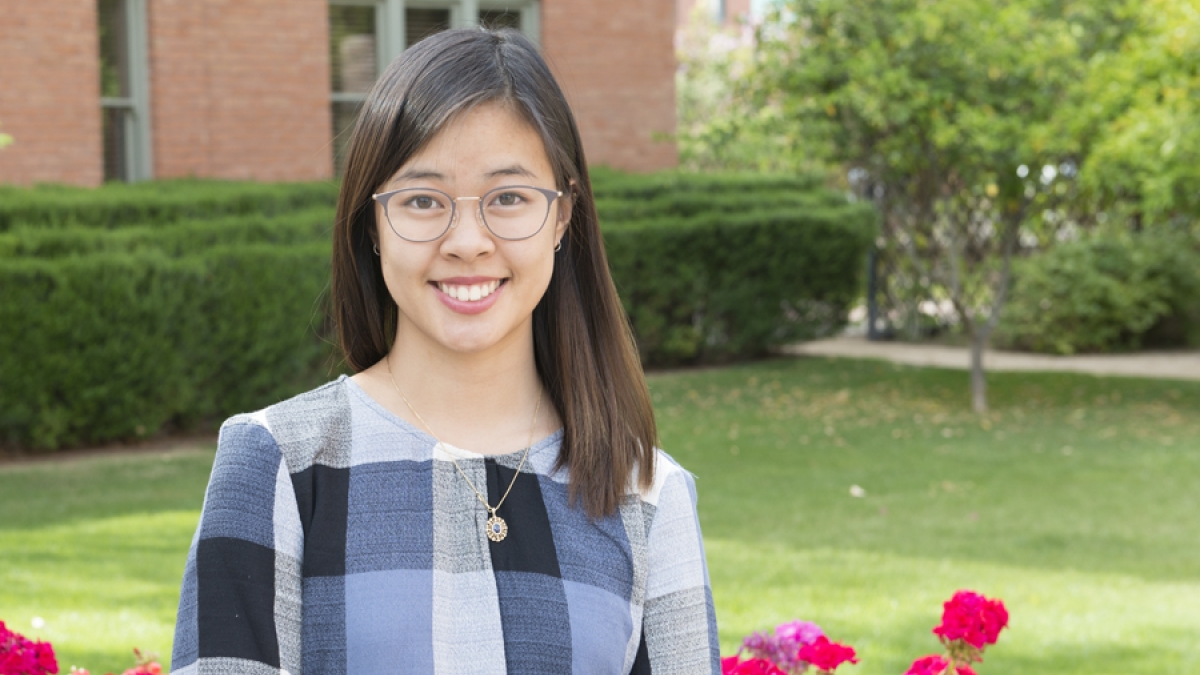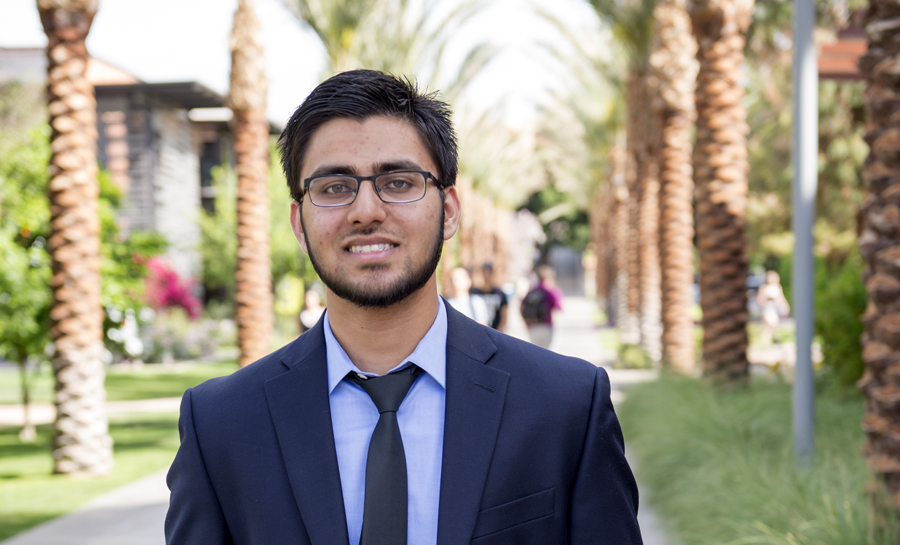Two ASU juniors win prestigious Goldwater Scholarship

Meilin Zhu, a junior majoring in biochemistry in the School of Molecular Sciences, is one of two ASU students who have been awarded the Goldwater Scholarship, the most prestigious national award for undergraduates in math, science and engineering. Photo by Mary Zhu
Arizona State University juniors Humza Zubair and Meilin Zhu have won Goldwater Scholarships, the most prestigious national award for undergraduates in math, science and engineering. Zhu, a biochemistry major, and Zubair, a biochemistry and biological sciences double-major, are both students in the School of Molecular Sciences and Barrett, The Honors College.
Working in the laboratories of ASU senior faculty and scientists at the Barrow Neurological Institute, their work ranges from neuroscience research to global health engineering with an emphasis on point-of-care technologies.
Established in 1986 in honor of former Arizona Senator Barry M. Goldwater, the program seeks to provide a continuing source of highly qualified scientists, mathematicians and engineers by awarding scholarships to the top undergraduate researchers in these fields. Each U.S. college or university may nominate up to four students per year to the program.
According to the Goldwater Foundation, 211 scholarships and 281 honorable mentions were awarded this year, out of a field of 1,280 nominees from over 2,000 colleges and universities nationwide. The one- and two-year scholarships will cover the cost of tuition, fees, books, and room and board up to a maximum of $7,500 per year. Zubair and Zhu were selected for this honor on the basis of their outstanding academic achievement and remarkable research output.
Zubair and Zhu also received assistance with their Goldwater Scholarship applications from the Office of National Scholarship Advisement, housed in the Barrett, The Honors College Tempe complex. Staff at ONSA help students compile and perfect their application materials, including resumes and personal statements.
Kyle Mox, director of ONSA and an associate dean at Barrett, The Honors College, said the Goldwater Scholarship is the most prestigious award for undergraduates in STEM.
“This accomplishment is actually quite significant, when you consider that each of the other 1,300 applicants was carefully vetted and reviewed by their home campus,” Mox said. “Goldwater Scholars are really the cream of the crop when it comes to our nation’s future researchers. You don’t see a Goldwater nominee that isn’t incredibly impressive, much less a Scholar.”
The on-campus competition for one of the four ASU nominations can be quite intense. This year, nearly 20 ASU sophomores and juniors vied for one of the coveted positions.
“I don’t think any of the campus applicants had less than a 3.95 GPA,” Mox said. “And all of them already had one or two years of research experience and several other awards. Our faculty nominating committee has an incredibly difficult choice to make every year.”
ASU is among the top universities in the U.S. for the Goldwater Scholarship. Over the past decade, 22 ASU students have been selected as Goldwater Scholars, ranking ASU among the top 10 in the U.S., ahead of Cornell, University of Chicago and Yale.
Curtis Peterson, a Barrett student majoring in physics and mathematics with the School of Earth and Space Exploration, received an honorable mention.
A future in neuroscience
Humza Zubair was offered a paid position for a year full time at Barrow Neurological Institute as a research assistant when he was just out of high school.
For four years, Zubair has been working in a lab at the Barrow Neurological Institute studying head movement and gaze coordination in healthy cats. By observing a cat’s movement and behavior, Zubair can gain insight into how the animal’s central nervous system interacts with its visual and sensory systems that affect movement, spatial orientation and balance.
Humza Zubair. Photo by Mary Zhu
“If we understand the basic functionality of a healthy system, then that gives us a reference point to understand and possibly cure a diseased system,” Zubair said in explaining his research, which may have implications for the care of humans.
He has presented his research at several meetings of the Society for Neuroscience and is co-author of two research reports published in the Journal of Neurophysiology and the Journal Neuroscience.
Zubair was also selected last year as an Amgen scholar to conduct research at the University of California, San Francisco.
“As a Tempe native, it was my high privilege to represent my hometown school in a nationwide competition, and I am honored to win the Goldwater Scholarship,” Zubair said. “Winning Goldwater has increased my confidence in my academic and professional abilities. I am now ever more motivated to continue contributing to new scientific literature.”
Zubair said the scholarship will help pay for another year of tuition at ASU, time he will use in preparation to pursue a doctorate in biomedical studies and medicine.
He also will continue his research into the human neural system, the pathways connecting the brain and the body’s nervous system.
“Deciphering the link between the brain and behavior has been one of the most challenging scientific endeavors. Although we are only beginning to understand the basic functionality of a few neural systems, we face the daunting task of curing diseases associated with dysfunctional neural networks,” he said.
Zubair gives credit to Miles Orchinik in the ASU School of Life Sciences and Irina Beloozerova at Barrow Neurological Institute for helping him win the Goldwater Scholarship by assisting him with sharpening his application and honing his research goals.
Solving global health issues
Meilin Zhu aspires to lead and mentor a team of researchers in engineering global health innovations at an academic research institution. Her research will focus on developing and translating novel point-of-care diagnostic tools and technologies, which will improve healthcare accessibility in developing nations. Ultimately, Zhu aims to disrupt cycles of poor health by providing innovative solutions to the world’s greatest health issues.
Zhu hopes to pursue a doctorate in biological engineering and become a principal investigator at a leading research institution.
“Winning the Goldwater Scholarship has been very exciting and rewarding,” Zhu explained. “The scholarship will definitely help me financially and professionally, as I apply for bioengineering PhD programs this fall.”
“I feel honored and excited to win the Goldwater Scholarship. During my freshman year, I discovered a passion for research and I felt that it (the scholarship) would be an important step in pursuing a research career,” she said. “Being interested in this scholarship, I was determined to put my best foot forward. So, actually winning it is quite the dream come true. I believe receiving this scholarship will be instrumental in pushing my research career forward and pursuing a PhD.”
Zhu said she is grateful for the assistance of “wonderful mentors I have at ASU. Dr. Karen Anderson (in the School of Life Sciences) and Dr. Jennifer Blain Christen (in the School of Electrical, Computer & Energy Engineering), along with their lab members, have supported me every step of the way, and I am so lucky to have them as advisors.”
Jennifer Green contributed to this story.
More Science and technology

ASU professor breeds new tomato variety, the 'Desert Dew'
In an era defined by climate volatility and resource scarcity, researchers are developing crops that can survive — and thrive —…

Science meets play: ASU researcher makes developmental science hands-on for families
On a Friday morning at the Edna Vihel Arts Center in Tempe, toddlers dip paint brushes into bright colors, decorating paper…

ASU water polo player defends the goal — and our data
Marie Rudasics is the last line of defense.Six players advance across the pool with a single objective in mind: making sure that…


